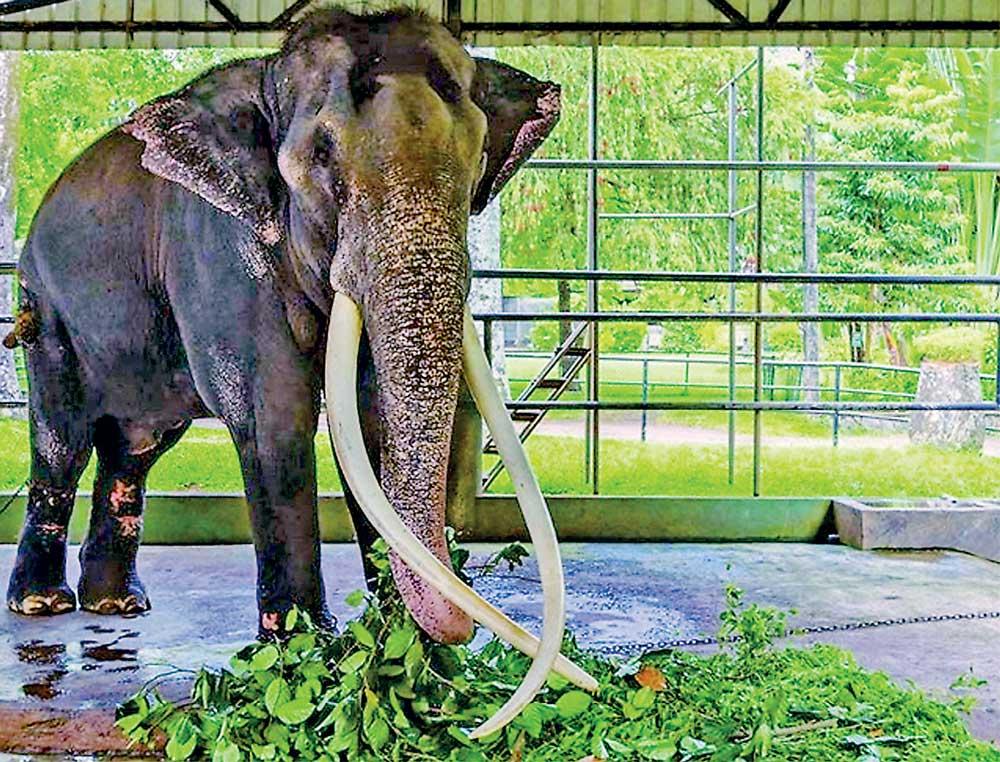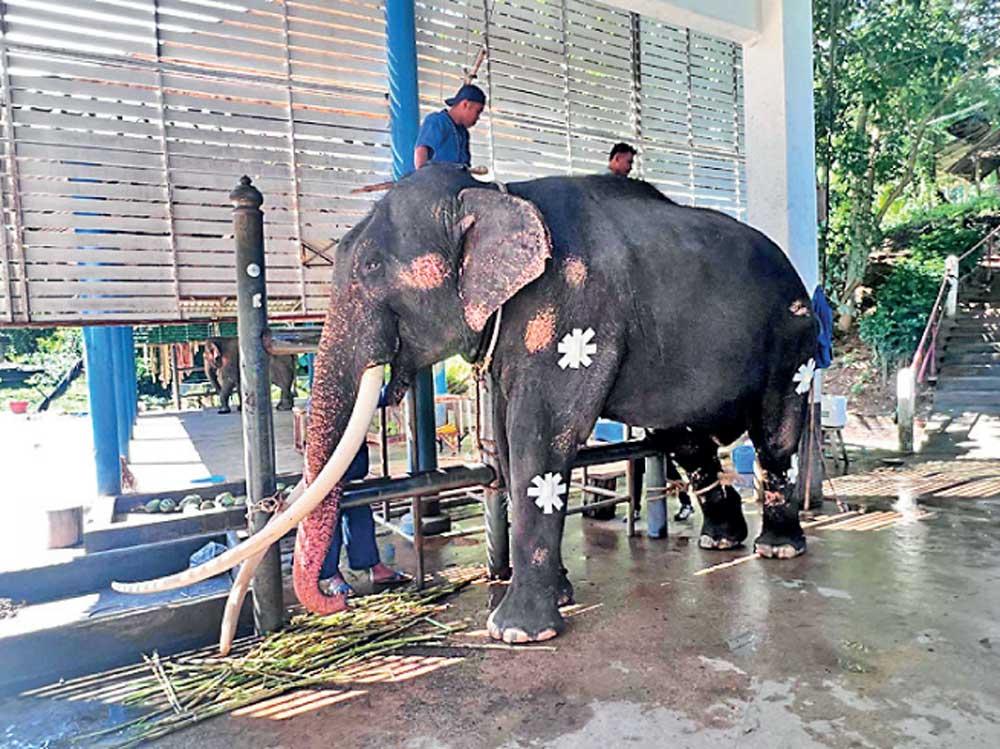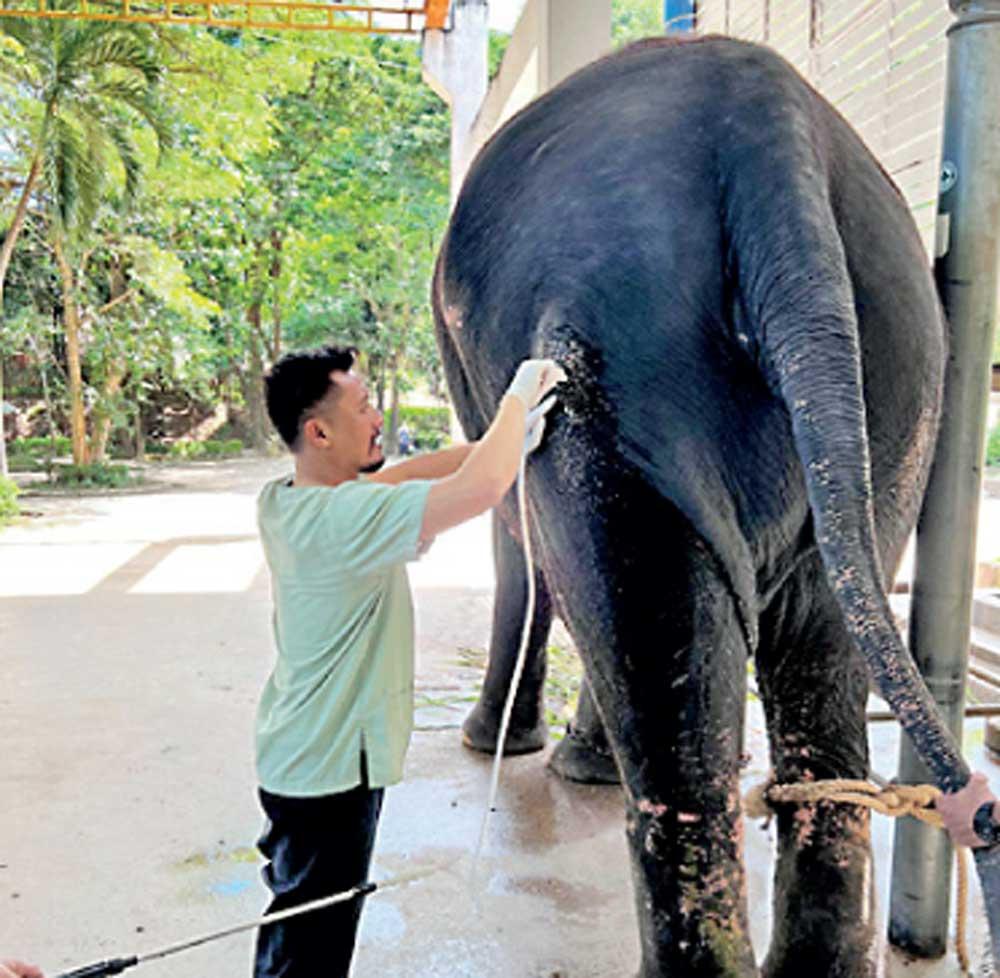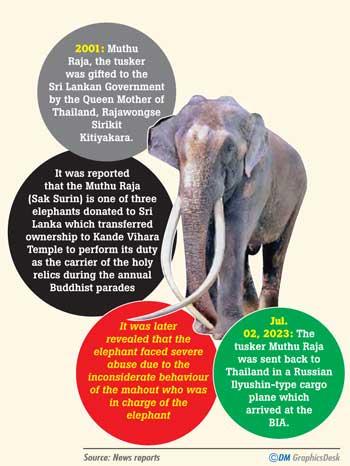Reply To:
Name - Reply Comment

Thai tusker Sak Surin or Muthu Raja at the Dehiwala Zoo in 2023


 Exactly a year ago, Muthu Raja, the Thai elephant gifted to Sri Lanka two decades ago, was in the news following a spat over the animal’s alleged mistreatment in the country. Finally, the elephant was flown back to the animal’s home country. The animal’s condition drew public attention both in Sri Lanka and Thailand.
Exactly a year ago, Muthu Raja, the Thai elephant gifted to Sri Lanka two decades ago, was in the news following a spat over the animal’s alleged mistreatment in the country. Finally, the elephant was flown back to the animal’s home country. The animal’s condition drew public attention both in Sri Lanka and Thailand.
A team of Thai experts along with local veterinary authorities examined the tusker and found two major health complications- swollen abscess with oozing pus on both sides of the hindquarter indicating inflammation which could eventually turn serious, and abnormal gait due to unbent and a stiff left foreleg which could render the elephant crippled if not given due corrective therapy, according to the then Thai Ambassador in Sri Lanka Poj Harnpol who is now retired and back in Thailand.
 A decision was made to airlift the tusker to Thailand for treatment, and the chief incumbent of Kande Vihara who held the custodianship of the tusker approved the transfer of the animal to his home country.
A decision was made to airlift the tusker to Thailand for treatment, and the chief incumbent of Kande Vihara who held the custodianship of the tusker approved the transfer of the animal to his home country.
One year down the line under treatment in Thailand, upon inquiry by the Daily Mirror on the condition of the tusker Harnpol said in a detailed response that the health and wellbeing of the tusker is gradually improving thanks to the substantial resources of personnel and equipment at the TECC (Thai Elephant Conservation Center).
He said regular wound dressing and abscess draining have brought about a complete cure of the inflammation on both sides of the pelvic, but the more delicate treatment involves gait adjustment.
After preliminary physical and radiographic observations, active and passive exercises were retained to help Muthu Raja walk, according to the former Thai envoy.
Training to walk
“The tusker has been trained and guided to walk over low wooden bar hurdles at appropriately measured strides to encourage the flexing of his left foreleg. Also, the musculoskeletal alignment of Muthu Raja is clinically addressed. Muscle strengthening and boost of blood circulation treatments on the area of the left front leg plus ultrasound therapy have resulted in the tusker being able to gradually flex and bend his left foreleg under the supervision of its mahout. It was a pity that after encouraging progress signs, Muthu Raja underwent a long period of musth (a condition of heightened aggression and unpredictable behaviour occurring annually in certain male animals, especially elephants and camels) in administered isolation with reduced movements. However, now that the musth is over Muthu has been very cooperative as a fast learner. Therefore, it is very much hoped that he will be able to flex the precise muscles of his left foreleg on his own initiative in the foreseeable future,” Harnpol said.
Muthu Raja also known as Sak Surin has been in Sri Lanka since 2001.
After arriving in Sri Lanka, the authorities entrusted the custody of the pachyderm to the Kande Vihara temple in the Kalutara district. With its prominent tusks and docile temperament, Muthu Raja had been called to travel extensively across the island to participate in various pageants ranging from major religious events to minor non-religious- events over the years, the former Thai envoy said.
Besides, the former ambassador said, in May 2022, the Thai Ministry of Natural Resources and Environment informed the Ministry of Foreign Affairs of Thailand of the petition raised by various entities such as concerned individuals and a non-governmental organisation for the protection of animal rights and welfare in Sri Lanka, due to the allegedly ‘inopportune’ handling of Muthu Raja and urgent need for the tusker’s medical treatment.
Consequently, the Thai Embassy in Colombo liaised with all parties concerned to see that Muthu Raja deserved proper welfare.
Relentless efforts
“To make a long story short and thanks to relentless efforts and cordial cooperation between Thailand and Sri Lanka at all levels, the live animal cargo airlift in a Thai-sponsored cum Sri Lankan custom-made metal cage with protective cushion materials was successfully executed without hiccups. The lengthy preparatory process, though, was not without obstacles. For one thing, the repatriation process must be in accordance with applied rules and regulations including the Convention on International Trade in Endangered Species of Wild Fauna and Flora (CITES). Fortunately, all formalities were cleared just in time. It should be noted here that during the transitory stage from November 2022 to July 2023 at the Dehiwala Zoological Park, Sri Lankan and Thai elephant handlers- mahouts- worked together and they succeeded in overcoming language barriers to care for the elephant. On the departure trip, a Sri Lankan mahout who had been with Muthu Raja at the zoo was asked to accompany the tusker in the flight together with Thai mahouts who had beforehand spent time familiarising themselves with the elephant at the zoo. In Thailand, the accompanying Sri Lankan mahout stayed with Muthu Raja at the Thai Elephant Conservation Center- TECC in the northern province of Lampang for about two weeks before returning to Sri Lanka. Even after a year, he is still fondly remembered as Uncle Pui (Upul) by the Thai fans of Muthu Raja,” the former ambassador said.
Call for positive action
The former ambassador said the mission was perceived as a call for positive action towards the improvement of animal rights and welfare.
“As it turns out, there is sustained awareness of the issues among the officials as well as the larger public in Sri Lanka and Thailand that keeps this momentum going. On an official level, there has been a constant exchange of visits and introduction of best practices in elephant care -taking into account cultural sensitivities and diversity. In addition, Thailand’s International Cooperation Agency – TICA envisages, with earmarked budget plan, a few short term and medium term projects to address best practice sharing in the field of elephant rearing as well as the expansion of veterinary professionals. One may as well say that the iconic superstar status of Muthu Raja helps to maintain continued interests and draw contribution to the better understanding and more committed actions in animal rights and welfare. Currently, at regular two-day-a week intervals, staff of the Thai Elephant Conservation Center conveys an hour-long live broadcast via its Facebook page to update on Muthu Raja’s daily routines, his health, his diet and his gradually growing socialization- while trying not to jeopardise his natural disposition. Now his doting mahout and thousands of followers affectionately call him in abbreviation as Muthu. Definitely, the tusker is a precious pearl to us all,” he said.
Also, he said there may not be a one-solution-fits-all approach to solve persistent shortcomings in elephant protection and care either in a wildlife environment or domesticated surroundings.
“But shared lessons from Muthu Raja’s saga tend to carry a clear message to us that as long as human beings attach utmost importance to the welfare and rights of other beings and try their best to make them truly feel ‘at home’ wherever they are, we can be certain that we are moving towards the rightful path,” he said.